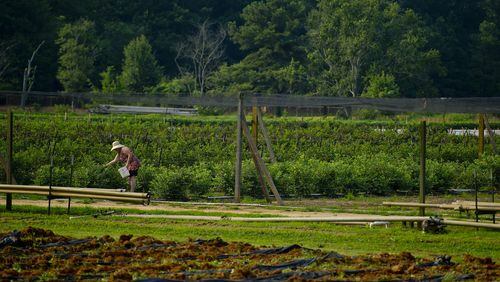A federal commission said Thursday that it was ending an investigation into unfair trade practices by Mexican blueberry farmers, a move that angered advocates for Southeastern farmers who have been seeking help from Washington.
The five-member U.S. International Trade Commission was unanimous in its decision to drop the probe, which was initiated by the Trump administration last fall.
Blueberries are not being imported into the U.S. “in such increased quantities as to be a substantial cause of serious injury, or the threat of serious injury, to the domestic industry,” the commission stated in a news release.
Had the commission found harm, the White House could have imposed tariffs on Mexico.
Georgia produce farmers say Mexican subsidies and lax labor and environmental laws have made it all but impossible for them to compete. They’ve been seeking new trade remedies.
The American Blueberry Growers Alliance blasted the trade commission’s decision.
“Throughout this case, blueberry growers across the United States provided the (commission) with extensive data and personal experiences about the significant harm caused by surging imports on the supply and pricing of blueberries in the U.S. market, especially during our critical growing and harvest seasons,” the trade group said in a statement. “We believed this data and testimony made a compelling case that safeguard measures were critical to the survival of our domestic farmers, and we are disappointed by the commission’s decision.”
One University of Georgia study estimated the state could lose nearly $1 billion in annual economic output and more than 8,000 jobs “unless something occurs to slow down the increase in low-priced Mexican imports of blueberries and vegetables.”
U.S. Rep. Austin Scott, R-Tifton, a senior member of the House Agriculture Committee, said he was “very disappointed and surprised” by the commission’s move since “in many cases, the situation is so bad that it isn’t economical for U.S. growers to even harvest their blueberry crop.”
About the Author







